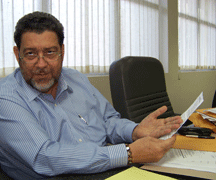
TAIPEI, Taiwan: – Vincentians can expect shifts in government policy on the heels of Prime Minister Dr. Ralph Gonsalves’ failure last week to secure the “yes” vote for constitution reform.
Gonsalves told citizens on Tuesday that the central executive of his Unity Labour Party (ULP) met Monday night to discuss the results of the referendum.
The Constitution Bill 2009 fell 23 percent short of the 67 percent “yes” votes needed to replace the 1979 charter.
A well-placed source told I Witness-News that the ULP was hoping for at least 60 percent, “a moral victory”, ahead of general elections, due by March 2011.
“The ULP, of course have met. We are an open, democratic party. We had a central executive meeting [Monday] night – quite a good central executive meeting – and the party emerges out of it stronger than ever,” Gonsalves told reporters in Kingstown.
Gonsalves said that history would “damn” the proponents of the “no” vote.
“[T]hey know in their hearts and in their consciences that history is going to damn them and that history is going to be generous to those of us who have sort to hold aloft the noble banner of all the principles and ideas enshrined in the new constitution.”
“Of that I have absolutely no doubt. And I am fortified by the fact that 44 percent of the people said ‘yes, we are on this nobility’,” he said at a press conference broadcast on radio.
Gonsalves elaborated on the “grievances” which, he last week said, had led to apathy among some ULP supporters. He mentioned the need for feeder roads and other infrastructure in some communities and the relocation of vendors.
He said that in trying to respond to the needs of some Vincentians others might feel aggrieved.
“The point that I am making is that even in solving some grievances of some, you create grievances for other people. And so they are going to always have grievances.”
“…[S]ome of these localised grievances would have to be addressed more aggressively,” he said.
Gonsalves believed that while citizens were pleased with the major policy and infrastructural undertakings of his government, they still wanted their immediate, and sometimes personal, grievances addressed.
“That is the challenge of representative government. And I speak it honestly and I affirm and assert that there are legitimate demands of people for more and better quality goods and services.”
He said that the resources available often cannot meet demands and his government would rearrange some resources to respond in a “strategic and tactical nature”.
Gonsalves, who is also Minister of Finance, announced that the budget for the 2010 fiscal year would be table in parliament shortly after the first half of January.





